|
I was once told that giving and receiving the Sign of Peace at Mass is founded on giving and receiving forgiveness. As I understood it, whoever was at the other end of that handshake was, by default, forgiving you of all wrongs you may have committed against him or her. I was a lot younger when I was told this and the idea of exchanging forgiveness for a handshake was pretty appealing. You mean I didn’t have to actually apologize? I just briefly grab the other person’s hand, maybe give a quick hug, and that was it? More than fifteen years have passed, and I have—hopefully—developed a more mature understanding of what it means to give and receive forgiveness. I haven’t heard of this blank-slate forgiveness handshake ever since. But the idea has stuck with me. That’s a pretty powerful thing, isn’t it, that we could approach the exchange of peace as God approaches us in the Sacrament of Reconciliation—as an all-encompassing, no-questions-asked offering of forgiveness? What is it we hear at Mass right before we exchange the Sign of Peace? “Lord Jesus Christ, who said to your Apostles, ‘Peace I leave you, my peace I give you;’ look not on our sins, but on the faith of your Church, and graciously grant her peace and unity in accordance with your will.” Peace and forgiveness are tightly interwoven; one is inseparable from the other. We’re reminded of this each and every time we go to Mass. We recognize that peace starts from within—that we ourselves are imperfect yet loved by God—and that that very same peace is to be extended to every member of our community. We build peace together, but only if we forgive one another—and ourselves. But it is often all too easy to step out of Mass on Sunday as though you’re entering a separate world; what happened in the chapel stays in the chapel. If we’re called to be salt for the world, then this cannot be so. The world must see that it is not so—each and every person we encounter must recognize us as a person of peace, a person who is motivated and challenged by a God of peace. In part, this is why I’m fascinated by faith-based peacebuilding. I spend a lot of my graduate school career researching how a religious imagination can impact the common good, and to me, there are fewer places so powerfully open to the role of faith as peacebuilding. But as a Catholic, I often ask myself: What does my faith tradition offer in this great interreligious effort? I do not claim to be an expert—I’ve barely scratched the surface of the literature. But in my research I keep coming back to the role of ritual. There is power in ritual, in repetition, in coming together as a community to grapple with the unknowable from the nitty-grittiness of our lived reality. Those of all religious traditions can attest to this. Certainly, a brief look at tragedies over the last several months will reveal faith communities of all varieties gathering to mourn, to pray, to remember. When we come together before God in community ready and willing to grapple with mysteries divine and unknown, we must necessarily come together ready to forgive, ready to build peace. How can we allow the People of God—gathered in Christ’s name—to stand and pray together and do anything less? And yet, we know that so often that all-important Sign of Peace is reduced to something perfunctory, half-hearted, something my younger self might find appealing. I know I’m guilty of this more often than not. How many unrelated, far-from-peaceful thoughts are on my mind as I spin around in my chair in the chapel and shake the hands of strangers? Peace and forgiveness can begin with the Sign of Peace. But they don’t end there. That first step out of the chapel is not a step away from that Sign of Peace, but a further entering into it. Ritual is powerful, and there are few rituals quite so unique in the spiritual tools offered to build a more peaceful world than the Mass. What, then, do we bring to the altar in our own prayer? How do we use rituals of all kinds to build peace, to extend and receive forgiveness? A good piece of Scripture for our reflection might be Matthew 5:23-24: Therefore, if you bring your gift to the altar, and there recall that your brother has anything against you, leave your gift there at the altar, go first and be reconciled with your brother, and then come and offer your gift.
0 Comments
"In light of Father’s Day, I have been reflecting on how the Father cares for his children, and how we can understand God’s fatherhood."
“… You, oh Lord, are our Father…” (Is 63:16) During an especially difficult time of transition in my life, I became very bratty with God. As in, I whined to God the Father, and was very spiritually dramatic. “Abba! Daddy!,” I screamed, “What are You doing with my life? What is going on?” The short answer: taking care of me. The long answer: taking care of me in ways I haven’t even begun to realize. In light of Father’s Day, I have been reflecting on how the Father cares for his children, and how we can understand God’s fatherhood. We live in an age characterized by fatherlessness. Personally, I don’t have the best relationship with my earthly father, and neither do many of my peers. This can sometimes damage our view of God the Father. Does the Father really love me? Does He like me? These and other questions can plague our spiritual lives as we seek to understand our roles and vocations in life. Someone somewhere along the way told me the Father loves me, and I believed them. But I have also wondered what that means. What does it mean to be taken care of by a good father? What does a good father look like? What role does spiritual fatherhood play in this age? To get some answers, I grabbed a few books. I also bribed my pastor with brunch one Saturday and asked him. The Catechism of the Catholic Church, in paragraph 2223, states that parents are responsible for “creating a home where tenderness, forgiveness, respect, fidelity, and disinterested service are the rule. The home is well suited for education in the virtues. This requires an apprenticeship in self-denial, sound judgment, and self-mastery - the preconditions of all true freedom.” The Catechism says parents, not just the mother or the father, but both create the home. How often in sit-coms, movies, or advertising do we see dads being labeled as irresponsible buffoons who can’t take care of their children or run a household without impending disaster? How often do we hear, jokingly of course, that a woman’s husband is her biggest kid, implying that she has to take care of him as if he can’t care for himself and others? In my conversation with my pastor, Fr. Michael, he pointed out the similarities and differences of biological and spiritual fatherhood. A spiritual father can never replace and cannot be as close as a biological father because the community a priest serves is diverse and varied. Human fatherhood, both biological and spiritual, is for the sake of directing children to depend upon God the Father. In other words, they are to train their children to not need them anymore. Fatherhood is meant to be a pilgrimage of surrender, directing the lives of their children to see that God has been working in their lives and caring for them all along. While a father will always be there for his children, praying for and supporting them, his mission is to train them to see God the Father for who he is and to be receptive to the Father’s love and his will for their lives. Fr. Michael said fatherhood should be approached with awe and gratitude and humility because God the Father is allowing a fallen human man to participate in his mission of loving his people, and this man might get it wrong. People fail. It happens. Even the best of fathers and priests and popes make mistakes. There was a reason Pope St. John Paul II went to confession every week. (What was he confessing? We don’t know. But clearly it helped him love us better.) The parable of the prodigal son could also be called the parable of the patient father. He longs for our hearts to be united to his heart, whether we are the faithful older son or the rebellious younger son. There is a place for each of us in our father’s house. No matter how petulant, rude, or down-right bratty we are with him, our Father loves us and cares for us. He will not fail us, even if we have no idea what his will is during a moment of turbulence. While on my way to work one morning, I passed a church that had a marquee saying, “Forgive others as quickly as you expect God to forgive you.” That phrase stuck with me the entire day to the point where I just had to write it down to look back on. Forgiveness can be so difficult when we’ve been hurt or feel we’ve been wronged. That little message to me from God reminded me of the work I need to do during Lent to prepare for Easter. The season of Lent is centered on God’s forgiveness of our sins and our willingness to be penitent. As we receive our ashes on Ash Wednesday, the priest often says, “Repent and believe in the Gospel.” Especially during this time of the year, we recognize the brief time we have on earth to do God’s will. This is a time in which we reach out to God to experience him in a tangible way through sacrifice, almsgiving, and fasting. On Ash Wednesday, we come together to show remorse for the times throughout the year that we have failed not only God, but also our family, friends, and fellow man. This month during the Catholic young adult group meeting in my area, a guest speaker shared that, contrary to what we might think, shame or guilt can be positive motivators. Sometimes, we can be so harsh on ourselves in dwelling on our imperfections that we don’t allow God to heal us. Acknowledging our sinfulness through guilt and accepting God’s mercy and forgiveness helps us to move on in striving to fix our wrongdoings. God will always accept us. We do not need to wait to “cleanse” ourselves for him. He will help us to choose right from wrong. If God, our flawless creator, can forgive us, who are we to deny it to others or ourselves? In Matthew 5:23-24, we are told, “If you bring your gift to the altar, and there recall that your brother has anything against you, leave your gift there at the altar, go first and be reconciled with your brother, and then come and offer your gift.” During Ash Wednesday, let us think of the ways in which we are slaves to sin and look for ways to repent and reflect on this during Lent. How can we be more open to God and seek his guidance? How can we be more forgiving to ourselves and others? Finding love takes patience and time. I am blessed to be in a relationship with someone I have known for over three years. What started as a friendship has become the kind of relationship I used to dream about. We love to do things like going on trips or just grocery shopping - it’s sharing experiences that means the most to us. Sometimes the littlest things are what we appreciate in each other, like how he knows how I like my coffee at any coffee shop. In return, I know that he likes ice in his glass of milk and likes getting homemade gifts for holidays and birthdays. I’ve tried to build both my friendships and relationship on shared experiences. I love getting to know someone, finding things in common, learning their interests, and spending time with that person. As a Catholic, I’ve tried to surround myself with people who support me and share my beliefs and focus in life. I get to wondering though, what is dating like for other Catholics? Where can we start?
Start at the beginning. In 1 Corinthians 13: 4-7 it says, “Love is patient and kind; love does not envy or boast; it is not arrogant or rude. It does not insist on its own way; it is not irritable or resentful; it does not rejoice at wrongdoing, but rejoices with the truth. Love bears all things, believes all things, hopes all things, endures all things.” This verse is a great place to start. When we appreciate God’s love for us, we can better understand how we deserve to be loved by others. Pope Francis speaks often about love, and when he visited the United States at the World Meeting of Families in Philadelphia, he said, “Love is shown by little things, by attention to small daily signs which make us feel at home. Faith grows when it is lived and shaped by love. That is why our families, our homes, are true domestic churches.” So whether you are in a relationship or not, here is a list of little things to remember as you persevere in your lives.
For all of you who are dating, see if you are incorporating these tips into your relationship. If not, give some of them a try. For those of you reading this who are not in relationships, some of these tips can really help friendships and even relationships down the road. I’ve found that with patience and effort, the little things will amount to bigger memories. In the meantime, it’s the little things that make a relationship resilient. The “I love you!”s and the laughter can be the little things that take the day-to-day interactions and turn them into months and years spending time with someone you care about. For resources on Marriage and Family, please click here. “Man, I can’t believe I saw the pope today! THE. POPE.” Everywhere I turn, I’m encountering men and women, young and old, believers and nonbelievers who are still in shock, electrified from the day’s events. And what a day it’s been! Months after the initial announcement, after countless preparations, programs, and prayers, Pope Francis was welcomed to the Basilica of the National Shrine of the Immaculate Conception overlooking the campus of The Catholic University of America. During his homily, Pope Francis called the church to rejoice, to proclaim the Good News to all and to step out of complacency and apathy. "Something deep within us invites us to rejoice and tells us not to settle for placebos which simply keep us comfortable," he said. It’s an experience people following the papal visit won’t soon forget, especially with all the coverage by global news outlets and social media alike. And yet, what will these people take away from the message of the Holy Father? Are they overjoyed to have been in his presence? Will they use the experience as a springboard to launch a new evangelization? Are they simply thrilled to post pope photos on social media in pursuit of as many “likes” and affirmations as possible? Are they annoyed because of the inconveniences brought about from having such a high level of security screen a crowd of tens of thousands of onlookers? What will the world remember from such an event? “Peace be with you,” the Pope had greeted the crowds, an invitation to set aside any and all of the worries, the disappointments, the troubles, and the restlessness burdening each and every one of those attending the Mass. This may not be one of the famous one-liners of Pope Francis the media picked up on as they ran commentary, but those words have been recorded in Sacred Scripture thousands of years ago and continue to be repeated countlessly each and every day around the world. How necessary is it for us to recognize this great greeting of blessing and to appreciate the call for us to focus on God and His infinite love for us! While the headlines will tell of Pope Francis’incredible addresses to the United Nations and a joint session of Congress for sure, the Holy Father isn’t as overly impressed by these displays of power. The only power he is awed by is that which radiates from the Cross and which resides perpetually in every tabernacle, which contains our Lord Jesus Christ present in the Most Holy Eucharist. The most incredible action then occurs at every Mass celebrated around the world-- and Pope Francis isn’t the first or only person to perform such a deed! To those who find the Mass to be boring or unnecessary in their spiritual lives, Pope Francis reminds them that: “The Eucharist is not a private prayer or a beautiful spiritual exercise, it is not a simple commemoration of what Jesus did at the Last Supper…[T]he Eucharist is Jesus himself who gives himself entirely to us. Nourishing ourselves of Him and abiding in Him through Eucharistic Communion, if we do so with faith,transforms our life, transforms it into a gift to God and to our brothers and sisters. Nourishing ourselves of that ‘Bread of Life’means entering into harmony with the heart of Christ, assimilating his choices, his thoughts, his behaviour. It means entering into a dynamism of love and becoming people of peace, people of forgiveness, of reconciliation, of sharing in solidarity. The very things that Jesus did.” The Eucharist is meant for every person, every nation, and the entire world! Similarly, Jesus is as truly and substantially present on the altar of St. Peter’s Basilica in Rome as on the east portico of the National Shrine here in DC or on the altar in my high school’s chapel in Lincroft, New Jersey. The mission of the Vicar of Christ, then, is to increase our faith and to bear witness to the love of our Lord and Savior. The Apostolic Visit to our nation is surely a tremendous and needed blessing: the faithful are united in the joy of the visit and are called to share this joy in their everyday lives and encounters with others. The Love realized in the Real Presence is the same which inspires and moves each of us to bring all, no matter their circumstances, to embrace and take part in this Love within the Universal Church.
To celebrate the Catholic Apostolate Center passing 50,000 "likes" on Facebook, Communications and Social Media Intern Andrew Buonopane created a list of 50 Ways to Enjoy your Faith. This is the fourth post in a five-part series where we'll share the whole list. Check back on the first Tuesday of the month for another installment! #20- Celebrate the Easter Octave Did you know that as Catholics, we celebrate both the “season” of Easter (which lasts 50 days) as well as especially celebrating the Octave of Easter which concludes this Sunday on Divine Mercy Sunday. #19- Devotion to Our Lady of Sorrows During Holy Week, we truly saw our Blessed Mother in her role as Our Lady of Sorrows. We experienced with her Christ’s death. How do you think she felt watching her son suffer so greatly? #18- Consider Parish Ministry Getting more involved in your parish is a great way to enjoy your faith! See if there are needs your parish has that you might be able to fill! #17- Adoration Eucharistic Adoration is a way to experience Christ in the Eucharist outside of the Mass. See if your parish has Adoration and if you’ve never gone before…try it! #16- Understand the Liturgy Sometimes we can get into the habit of “going through the motions” at Mass. Next Sunday, pay special attention to the rituals and prayers of the Mass. Ask yourself why we say and do everything at Mass. Take some time to learn more about the liturgy! #15- Devotion to Guardian Angel “Angel of God, My Guardian Dear…” is a prayer you may have been taught as a child. But did you know there’s a lot more to Guardian Angels? Check out this blog post which talks more about them! #14- Practice Forgiveness Turning the other cheek isn’t easy to do sometimes. But practicing forgiveness is an important part of our faith lives. #13- Devotion to Thomas Aquinas St. Thomas Aquinas was one of the Church’s earliest scholars. Much of his work is still taught today in theology and philosophy classes. Have you ever read his arguments on the existence of God? If not, take some time to check it out! #12- Devotion to Teresa of Avila St. Teresa of Avila is a great saint to model in your daily life. Take a moment to learn more about her! #11- The Paschal Mystery: Last Supper to Resurrection The Paschal Mystery is what we just celebrated last week in the Triduum. We recall Christ’s death and Resurrection and the liturgies celebrated at the Triduum take us on this journey.
To read the previous installment in this series, click here: Part I | Part II | Part III Andrew Buonopane is the Communications and Social Media Intern at the Catholic Apostolate Center “For God so loved the world that he gave his only Son, so that everyone who believes in him might not perish but might have eternal life. For God did not send his Son into the world to condemn the world, but that the world might be saved through him.” (John 3:16-17)
Most parents feel incredibly protective of their children and hate to see them hurting. Chances are, if you ask your mom or dad, they would say that watching you break an arm, fall off your bike, or be picked on by a bully was painful for them. Maybe you are a parent who has experienced how hard it can be to see your child in pain. God, who is infinitely perfect, loved us so much that He was willing to sacrifice His only Son so that we would have a chance at Heaven. God knew that some would chose to reject His love. He knew exactly how painful it would be, for both Himself and the Blessed Mother, to watch His Son suffering on the cross. On Good Friday, we commemorate the ultimate sacrifice. The Stations of the Cross allow us to journey with Christ the last hours of his life on earth. Even if you are unable to physically move from station to station, it is a wonderful opportunity to mediate on all that Jesus was willing to undergo for our sake. The First Station: Jesus is condemned to death. The Second Station: Jesus carries His cross. The Third Station: Jesus falls the first time. The Fourth Station: Jesus meets His mother. The Fifth Station: Simon of Cyrene helps Jesus to carry His cross. The Sixth Station: Veronica wipes the face of Jesus. The Seventh Station: Jesus falls the second time. The Eighth Station: Jesus meets the women of Jerusalem. The Ninth Station: Jesus falls the third time. The Tenth Station: Jesus is stripped of His clothes. The Eleventh Station: Jesus is nailed to the cross. The Twelfth Station: Jesus dies on the cross. The Thirteenth Station: Jesus is taken down from the cross. The Fourteenth Station: Jesus is laid in the tomb. Imagine how the Virgin Mary must have felt when she met her Son on the way to Golgotha. Her heart must have been breaking watching Him struggle to carry the cross. Her tears must have hurt Jesus’ own heart. After Jesus fell for the third time, He got back up and continued on. He didn’t grumble or complain. It would have been easy to decide that it was too hard and to just stop. When we carry our own cross, however small that burden, it is incredibly easy to complain to God and to say that we cannot do it. We might not be able to on our own, but with God’s help, all things are possible. In His last moments on the cross before He died, Jesus was thinking of us. “Father, forgive them, they know not what they do.” (Luke 23:34) God stands ready to give us His unconditional love and forgiveness. He has already done the hard part. Through His suffering and death, He threw open the gates to Heaven. He is ready to give us the graces to get there. All we need to do is ask Him for it. Jennifer Beckmann is a Staff Assistant for the United States Conference of Catholic Bishops. A few weeks ago, there was a story making its way around the internet about a priest who was taking Confessions via Snapchat, a popular app that allows users to send pictures and video with captions which disappear after a few seconds. There has been no concrete confirmation that this priest is a Catholic priest in good standing with the Church, but nevertheless it made me think about the concept of receiving Confession in non-traditional ways. At first glance, the idea of Confession via Snapchat seems like an interesting idea - for priests to meet young people where they are and making an often overlooked Sacrament readily available. But this type of Confession diminishes the Sacramental importance of receiving absolution, and also has canonical implications as well.
For a priest to offer Confession via Snapchat makes the Sacrament invalid, as the Code of Canon Law clearly states that “the proper place to hear Sacramental Confessions is a church or oratory” and that “Confessions are not to be heard outside a Confessional without a just cause” (CIC 964 §1, §3). For a valid Sacrament to take place, the priest and penitent must be physically present in the same place. With the advent of technology, the Code ensures that the Sacraments are still celebrated properly, and that we aren’t receiving absolution by email, telephone, text, or Snapchat! Going to Catholic schools my entire life, the seasons of Lent and Advent were popular times for schools to offer Confession. Typically, we would be shepherded to the Church or Chapel during theology class and given the opportunity to go to Confession if we wanted to. However, one time I received a knock on my door and was told that if I went to Confession, I would receive a cupcake. It seems silly now to basically be bribed by a cupcake, but not one to turn down free cupcakes, I happily obliged. Technically, this also is not a licit celebration of the Sacrament. To go to Confession, the Code also tells us that a person must be “properly disposed” which means not coerced by another person (CIC 962 §1). Although these canonical distinctions might seem like trivial technicalities, they ensure that we enter the Sacrament with an open heart, ready to receive the gift of God’s love and forgiveness with no reservations. For a good part of my life, I was uncomfortable going to Confession, but as I’ve gotten older I’ve learned to become less afraid of this Sacrament. One of the best experiences I had with Confession was in college when priests would come to our residence halls to offer the Sacrament. The residence hall lounge had been turned into a casual Confessional and I had a wonderful discussion with the priest who was there. I realized that going to Confession doesn’t have to be a big scary endeavor and the feeling of grace when I received absolution was incredible. This past Sunday we celebrated Palm Sunday, the beginning of Holy Week. At the end of this week we will celebrate the Easter Triduum. Going to receive the Sacrament of Confession is a wonderful way to prepare yourself spiritually for Holy Week. From Palm Sunday, throughout the Triduum, and on Easter Sunday, we journey with Christ as he sacrifices himself for our sins and rises again. Confession prepares our hearts for the joy of Easter morning, allowing us to begin the season of Easter with a “clean slate.” Haven’t been to Confession in a while? Check out our Lenten Resource Page which includes some great resources on the Sacrament of Penance. Rebecca Ruesch is the Blog Editor for the Catholic Apostolate Center This week's homily on sin brought up a host of questions during our RCIA class. Are some sins worse than others? Why do we need to confess to a priest? Why does the Pope go to confession so often? Now, truth be told, I was a little off my game that morning. It had been a late night, but my co-catechist and I were doing a fairly good job of breaking open a subject we had not prepared to talk about.
Then, however, came the question, "But are little sins every now and again really a big deal? I mean as long as you are generally a good person, aren't a few sins here or there ok?" Well, I fell flat on my face, and found myself waste deep in relativism. Thankfully my partner saved me from committing the greatest sin of any minister: leading the faithful astray. My big blunder in the vocal vomit of my answer was forgetting Jesus. In my attempt to reassure this person that we are all human, and mistakes and sins are part of that humanity, I had forgotten the all-important challenge of being ever more human, that is, to be ever more like Christ. The Pope goes to confession so often because he has grown close to Christ in his life, and encountering the person of Jesus so intimately, he more easily recognizes the imperfections that you and I tend to miss completely. Confession then is not meant to berate you for the bad things you have done, nor is it meant to embarrass you by telling seemingly trivial things to a strange man in stranger clothes. Rather, Confession is about looking at your relationship to Christ and seeing where you were not Christ-like in your life. After all, all sins are relational because sin never affects me individually. Sin affects those around us: our family, friends, co-workers, and God. When we ask God through the priest to forgive our sins we are asking God to begin the process of healing those strained and broken relationships in our lives. Viewing sins as a relational reality also requires that we not stop our penitence once we leave the confessional. Being more Christ-like means working to mend those relationships we have strained by our selfish and sinful actions. We are challenged to become more selfless, more giving, and more loving as Christ was in his life, death and resurrection. Throughout life we are very much on a journey to know and encounter Jesus ever more closely, and it is in that pilgrimage that we see how we ought to live as women and men of faith. So, to finally answer that person’s question, yes, we are human and we will make mistakes. We will constantly need to return to confession again and again often for the same little things we keep doing. We are on a journey to be more Christ-like, and that encounter challenges us to love and act as he did. The great hope in our life is that we get better at being Christians as we deepen our relationship with Christ. Confession gives us the grace to do this, and to be transformed ever more fully into who we were meant to and will become. Brian Niemiec is the Curriculum Consultant for the Catholic Apostolate Center Editor's Note: This Post was originally published on Catholic How and was reprinted with permission This Lent, my 2nd grade class is in charge of encouraging our school to donate to CRS Rice Bowl, a program which helps raise money for those who are less fortunate in 6 places around the world. Our school’s efforts help students raise awareness of hunger and poverty. My class has been determined to give all they can in the past for service projects, but what sets this project apart? That is the question I have asked my students to ponder. One girl told me that her snack after school is Doritos, so for each day she doesn’t snack on this favorite treat, a quarter will be added to her jar for someone “hungrier than me.” Another boy told he scours his house and cars for loose change, and drops it in the Rice Bowl whenever he finds anything, even a penny. He asked me, “Every bit counts, right Ms. Kirby?” Indeed it does.
As Pope Francis reminded us at the beginning of the Lenten Season, our fast must be a fast from indifference toward others. The time has come for us to use these remaining 40 days to contemplate our actions toward others, striving for the utmost respect and care for them. Instead of searching for ways to improve our own lives, maybe it is time that we turned to the poor and vulnerable and improve theirs. Francis writes, “Indifference to our neighbor and to God also represents a real temptation for us Christians. Each year during Lent we need to hear once more the voice of the prophets who cry out and trouble our conscience.” It is not sacrifice to give of our excess or to simply change our diets during Lent, our Holy Father is calling us to fast from our indifference and turn to love. In this New Evangelization, there are tangible and realistic ways for each and every one of us to change hearts. This change must start within our own broken and sinful hearts and through God’s mercy and forgiveness. For each thing we do for our hearts, let’s do something for someone else. Here are some ways you could “fast for indifference”: 1. Do an Examination of Conscience and ask God to forgive your sins through the Sacrament of Reconciliation 2. Go and forgive those who have wronged you 3. Pray for those in your life 4. Intercede for others each day 5. Fast and acknowledge the poor 6. Volunteer in some way, perhaps by serving in a soup kitchen or shelter 7. Add prayer time to your day 8. Write in a journal 9. Attend Mass more frequently As you go about your day during this Lenten season, stop and think about what Jesus has done for your life and what you have done for others. Contemplate all that you have done and remember your responsibility to love others as Christ loved us all. If what we can give only fills a CRS Rice Bowl, or we give up indifference and care deeply for the poor, just know that “every bit counts.” Krissy Kirby is a teacher for the Archdiocese of Washington, D.C. To learn more on the CRS Rice Bowl please check out our Lenten Resources! When he broke open the fifth seal, I saw underneath the altar the souls of those who had been slaughtered because of the witness they bore to the word of God. They cried out in a loud voice, "How long will it be, holy and true master, before you sit in judgement and avenge our blood on the inhabitants of the earth?"
(Revelation 6:9-10) As Christians, we are tasked with following the teachings of Christ over those of the world. Doing so often puts us at odds with the latter, amid accusations of fostering inequality, forcing our beliefs on others, adhering to obsolete traditions, or getting involved in matters that do not concern the Church. It’s true that there have been many efforts over the centuries to silence Christians—persecution is nothing new to the Church—but Jesus had warned that believing in Him would not make us popular in the eyes of the world (John 15:18, c.f. 1 John 3:13, 2 Timothy 3:12, 2 Corinthians 4:8-11, Revelation 2:10). The most recent evidence of persecution can be seen in the ongoing ISIS attacks in the Middle East, where people who have been living in areas that have been Christian for nearly 2,000 years are suddenly being forced to convert or die. Though this grave situation is happening half a world away, it is critical that we do not remain apathetic during our daily routines. Cardinal Donald Wuerl of Washington, D.C., in his closing remarks at The Catholic University of America’s Mass of the Holy Spirit, warned that human atrocities can occur if people remain silent about the plight of others. As Christians, we are all united in the body of Christ through our baptism (see 1 Corinthians 12:12-26, c.f. Romans 12:15) and as such, we must care about what affects another member. To that end, Saint Paul writes, “If one member suffers, all suffer together; if one member is honored, all rejoice together.” While it is easy to forget the persecution occurring beyond our borders in our comfortable day-to-day activities, we cannot simply be sorry for the terrible suffering endured by others—these are truly our brothers and sisters in the faith who need our continuous compassion and support! We may not be able to fully imagine the terror they are experiencing but we can at the very least offer prayers and sacrifices (i.e. suffer with them) on their behalf. Never doubt the value of prayer. It remains a most powerful means of comfort, hope, and strength from and in God. Pope Francis has stressed that “prayer, in the face of a problem, a difficult situation, a calamity…is opening the door to the Lord, so that He can do something. If we close the door, God can do nothing!” When we offer our prayers, we are also expressing our trust that God is more powerful than the problems presented by the world—He can bring good out of evil—as we read of many biblical miracles when God’s people prayed for deliverance and forgiveness. When we pray, we remember the needs and welfare of our brothers and sisters in the faith and become united through our communication with God. With sincerity and reverence, the words spoken aloud or in one’s mind and heart are infinitely more effective than simply pitying the plights of others. In spite of all the terrors and injustices reported to and/or experienced by us each day, let us never forget to hope! Suffering is indeed a part of life, but by the Passion and death of Christ, salvation for the world has been achieved. We can take comfort and rejoice that our own suffering can be joined with His and offered up as gratitude for His willing Sacrifice: because of His subsequent resurrection, we too can look forward to being raised. What will separate us from the love of Christ? Will anguish, or distress, or persecution, or famine, or nakedness, or peril, or the sword? As it is written: "For your sake, we are being slain all the day; we are looked upon as sheep to be slaughtered." no, in all these things we conquer overwhelmingly through him who loved us. For I am convinced that neither death, nor life, nor angels, nor principalities, nor present things, nor future things, nor powers, nor height, nor depth, nor any other creature will be able to separate us from the love of God in Christ Jesus our Lord. (Romans 8:35-39) Thomas Wong is an undergraduate student at The Catholic University of America and a member of the Catholic University Knights of Columbus. Humanity can sometimes let us down. This is a lesson I have learned in the past few years in dealing with some troubling times in my family. People are often untrustworthy, imperfect, and make mistakes, and this is true even in the closest of families. Each one of us carry bruises and pain from times when we have been let down by our neighbors, family, and those we’ve trusted. The weight of sin can be too much for some of us, and it pulls us deeper and deeper away from hope. That is where trust in God comes into the picture. When the world burdens us with failures, broken promises, and sadness, Christ is there to pick us up with strength, promises of eternity, and joy in the Lord! Psalm 25: 4-7 reminds us that we need to trust in the Lord’s goodness and forgiveness to guide the life journeys we’re on:
“Show me your ways, Lord, teach me your paths. Guide me in your truth and teach me, for you are God my Savior, and my hope is in you all day long. Remember, Lord, your great mercy and love, for they are from of old. Do not remember the sins of my youth and my rebellious ways; according to your love remember me, for you, Lord, are good.” Throughout the Bible, we see God’s promise of hope and forgiveness. Learning from his example, it is our job to imitate the Lord’s forgiveness with those who have wronged us, and accept forgiveness in return. When Peter asked Jesus in Matt 18: 21-22, “Lord, how often shall my brother sin against me and I forgive him? Up to seven times?,” what was the response? “Seventy times seven” (….or more of course). We must strive to imitate this forgiveness in our everyday lives, too. Forgiveness is necessary for cleansing our hearts, but Jesus calls us one step further yet: to love as he loves. It can be very simple to love or it can be very difficult, the choice is our own. During some of the most difficult years with my family, I knew that I had a decision to make. I could either harbor resentment towards those who hurt me, or I could try to forgive them and love them in whatever way I possibly can. Today, I still can become irritated when tensions rise, but I’m trying to look at the situation through a lens of love. Even if it breaks your heart, even if all efforts seems lost, by showing love to your neighbors and forgiving transgressions, you are imitating Christ whether you realize it or not. Strive for that same goodness and righteousness with which Christ instructed his disciples: as I have loved you, so you must love one another. Go out and do the same! Krissy Kirby is a recent graduate of The Catholic University of America in Washington D.C., and will soon be teaching Kindergarten in the Archdiocese of Washington. As the Church and world celebrate the canonization of St. John XXIII and St. John Paul II today, it is important to note the significance of this day on which these canonizations are taking place, Divine Mercy Sunday. For St. John Paul II, the Mercy of God was an early and prevalent theme in his pontificate. In 1980, he issued the encyclical, Dives in Miseracordia, which not only views Jesus Christ as the “Incarnation of mercy” (2), but also teaches that mercy is “the fundamental content of the messianic message of Christ and the constitutive power of His mission” (6). The ramification of such a bold way of describing mercy challenges human beings to move beyond a basic understanding of justice. He notes that “mercy has the power to confer on justice a new content, which is expressed most simply and fully in forgiveness” (14).
Forgiveness in an age of self-centeredness and rabid individualism is often seen as weakness. And yet, through the seeming weakness of the Cross, his “sorrowful passion,” forgiveness, love, and mercy are offered “to us and to the whole world” (Cf. Chaplet of Divine Mercy). They are confirmed in the Resurrection of Jesus Christ who appears to his disciples and takes away all doubt, bringing peace to those in fear. All of the baptized are called to carry on this mission of Christ that offers mercy to a suffering and broken world. A life lived in mercy will lead to greater unity with one another. St. John Paul II when he canonized the visionary of Divine Mercy, St. Faustina Kowolska, and declared the Second Sunday of Easter, “Divine Mercy Sunday,” in the Jubilee Year of 2000, said in his homily that day, that Jesus “showed us the many paths of mercy, which not only forgives sins but reaches out to all human needs…every kind of human poverty, material and spiritual” (Homily for Divine Mercy Sunday, 4). True and lasting forgiveness that leads to living a life of deeper compassion and mercy can only occur with trust. The Apostle Thomas in today’s Gospel passage did not trust the word of witness of his brothers and sisters in the Upper Room. He needed to experience the mercy of Jesus Christ for himself, as do we. It is only through a personal encounter with Christ as the Merciful One that we have the graced strength to say, “Jesus, I trust in You!” Fr. Frank Donio, S.A.C., D.Min. is Director of the Catholic Apostolate Center. Click here for Canonization resources and a webinar on the new pope saints. This blog post was first published earlier today on the St. Joseph’s College of Maine Theology Faculty Blog. Fr. Frank is an adjunct professor on both the undergraduate and graduate Theology faculties. Click here to learn more about our cooperative alliance with St. Joseph’s College Online. As a catechetical leader in a parish, this is my first experience being involved in a Rite of Christian Initiation for Adults (RCIA) program. I am a cradle Catholic, born and raised in the Church, and have had no personal acquaintances go through the RCIA. This year, I have participated on a leadership team to observe how the RCIA is done catechetically. Now that the Easter Vigil has passed and the candidates have been fully initiated into the life of the Church, they are moving into mystagogy, a time where they will process what they have just gone through.
During this time studying the mystery of Christ and his life within us, I cannot help but see how God has formed me this year. Cyril of Jerusalem wrote, “You who are soon to be enlightened, already you are gathering the spiritual flowers, to weave heavenly crowns” (Catechetical Lectures, Prologue, 1). St. Cyril recognized that those who are initiated into the Church learn of Christ’s life within them through initiation at Easter. The “mystery” that we study during mystagogy is not up to us to be solved or remain unsolved. Rather, it is a mystery that we can continue to grow into throughout our lives. I, a lifelong Catholic, a member of the RCIA team, and graduate student in Theology, am still trying—with the grace of God—to weave my heavenly crown alongside those who have just joined the Church. We can all continue to grow in the mystery of our life in Christ. Much of St. Cyril’s Catechetical Lectures to the neophytes have to do with turning away from sin, and choosing a heart of stone over a heart of flesh (Ezekiel 36:26). St. Cyril writes, “If any here is a slave of sin, let him promptly prepare himself through faith for the new birth into freedom and adoption” (Lecture 2). St. Cyril is not just addressing the newly baptized, but everyone in the congregation. Why should God forgive us who continue to sin? Why do we deserve such a freedom? How can we be adopted by God? What kind of love could overpower the sins I have committed? These are the mysteries that we reflect on in mystagogy. While candidates have a new-found life through baptism in Christ, we all renew our baptismal promises at Easter. We are all called to continue to reflect on the answers to those questions. My experience as a team member with the RCIA has showed me that in bringing others into the Mystery, Christ is also calling me back to remember the Mystery of God’s love in my own life. Easter provides us the time to remember and renew our baptismal promises. In that renewal, we can remember that mystagogy is not just for the newly initiated, but for everyone. We can all grow in knowledge of the Mystery of Christ that we experience in the church at Easter and in our everyday lives. Thomas Coast currently serves as an Apprentice Catechetical Leader in the Diocese of Manchester, New Hampshire. He is currently working on his Master’s Degree in theology through the University of Notre Dame’s Echo Program. In my blog post on God as Infinite Love posted last Thursday, I reflected on praying as an active participation with God as the infinitely loving Father. What it did not address, however, were the practical realities concerning one’s life of prayer. To put it another way, it didn’t mention that such a task was hard to live out! With all the distractions and chaos of everyday life, it is too easy to fall into the trap of forgetting one’s dependence on God for all things. This trap, due to the human condition of sin, is in a way inevitable. So how does one persevere in praying when such distractions and forgetfulness occur?
The easy answer would be “don’t get distracted and don’t forget you depend on God for all things!” But let’s be honest with ourselves. Is that really practical? In a world of social media, can we, as humans, keep our focus on God at all times? I think most people, if sincerely evaluating their own lives, would say no. What do we do, then, to refocus on God and return to encountering His ceaseless love? I think there is a two-fold answer to this question that has been answered by Pope Francis and Blessed John Paul II. The only way we are even capable of persevering, that is, getting ourselves back on route, is to realize and always remember God as Infinite Mercy. In addition, we must also humbly accept his never-ending forgiveness, for doing such is an act of recognizing that we need Him (and not the other way around!). Blessed John Paul II dedicates an entire encyclical for reflecting on God’s Mercy. In Dives in Misericordia, he uses the parable of the prodigal son as an analogy (which was the Gospel reading two Sundays ago, if you recall). The son, who received a portion of his father’s inheritance, decided to spend it on a “loose lifestyle.” However, he soon realized what he had done, and how it had left him hungry. He reached such a point of guilt and hunger that he made the decision to go back to his father and say ‘Father, I have sinned against heaven and before you; I am no longer worthy to be called your son. Treat me as one of you hired servants.” But when the son heads back to his father’s house, before he can even finish his prepared statement, the father orders his servants to put the best robe on him and prepare a feast of celebration. This scripture passage shows that God’s mercy is an act of faithful love. God is faithful to his fatherhood and faithful to the Infinite Love He offers us in prayer. This is His Mercy, and it is a reminder to us all that God’s Love will never fail us. Think how generous this is! Looking back at the parable, the generosity of the father (when the son returns home) is so great, it angers the oldest son. The father responds, saying, “but now we must celebrate and rejoice, because your brother was dead and has come to life again.” The father’s fidelity to his lost son is totally and completely concentrated on the dignity of the son. This is the same way with God, our Father. The parable reveals that God’s Mercy is, in itself, an act of renewing His gift to us, our humanity. What does this have to do with our sought-out questions? This understanding of God’s Mercy, that is, as the prodigal son’s father, explains to us why we need God’s Love and Mercy. God’s Love and Mercy give us our human dignity. When we lose sight of God in our life, we lose sight of our human dignity. We lose it to such an extent that, deep down, we realize we are missing something. We realize we need God’s Mercy and Love to renew our human worth. It makes perseverance in a life of prayer that much easier, because we don’t have to worry about God abandoning us! However, it also makes it that much harder, because acknowledging our need of God requires a deep sense of humility. In his first Angelus, Pope Francis reminds the crowd that God never gets tired of forgiving, but we get tired of asking for His forgiveness. We must strive to come to God with an open and humble heart, as God will be eagerly waiting to offer His Forgiveness. Pope Francis does not just remind us to never tire of asking for God’s forgiveness, but he is a living testimony to that message. Just look at his interview with America Magazine. Before he talks about the Church needing to be a hospital of mercy, he first answers the question concerning who Pope Francis is. His answer: “I am a sinner whom the Lord has looked upon.” Before encouraging others to be merciful, he recognizes that he himself is in need of God’s mercy. He humbly accepts God’s Mercy Like the prodigal son, we wander off in our lives until a certain point hits us where we realize we are missing something. What do we need to do to ensure that we are able to get back to prayer, that encounter with God’s love? We first need to obtain the virtue of humility, like Pope Francis, to realize that we are lost and in need of God to renew us. To persevere in praying, all we need to do is say the words Pope Francis said in the interview: “I am a sinner whom the Lord has looked upon.” Out of that humility, we can accept God’s Infinite Mercy, because we know, that like the prodigal son’s father, He will always be faithful. For some simple reflection, listen to this song by Matt Maher. It has helped me many times: http://www.youtube.com/watch?v=LuvfMDhTyMA Andrew St. Hilaire is the Assistant to the Director of the Catholic Apostolate Center |
Details
Archives
July 2024
Categories
All
|
About |
Media |
© COPYRIGHT 2024 | ALL RIGHTS RESERVED

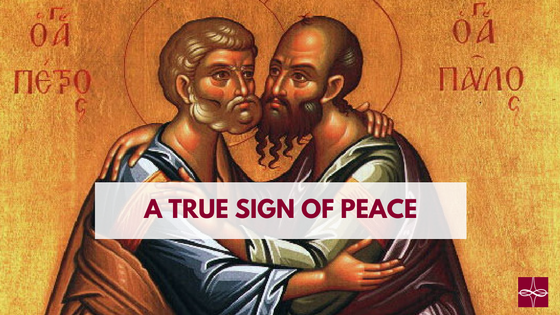

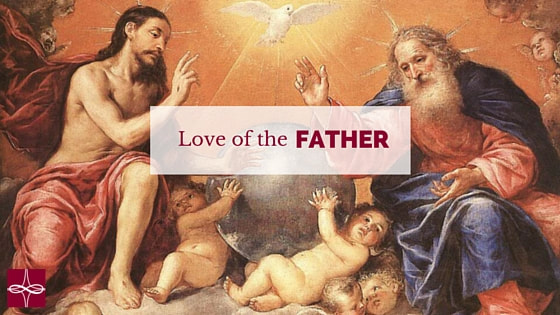

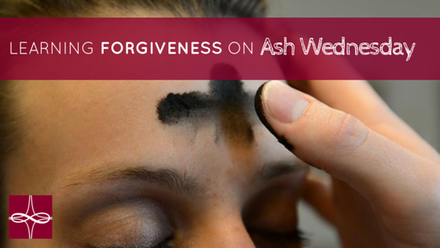





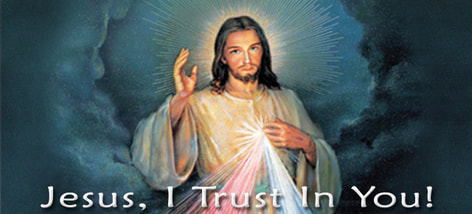


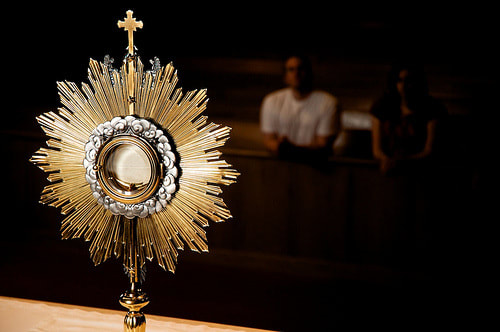
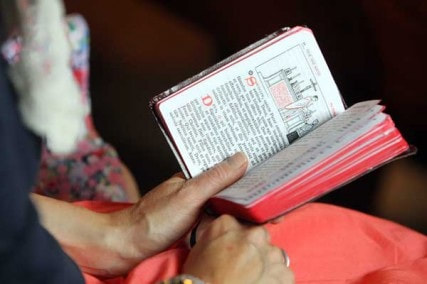







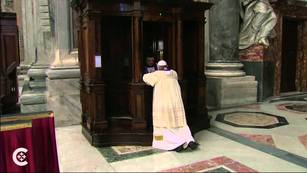





 RSS Feed
RSS Feed